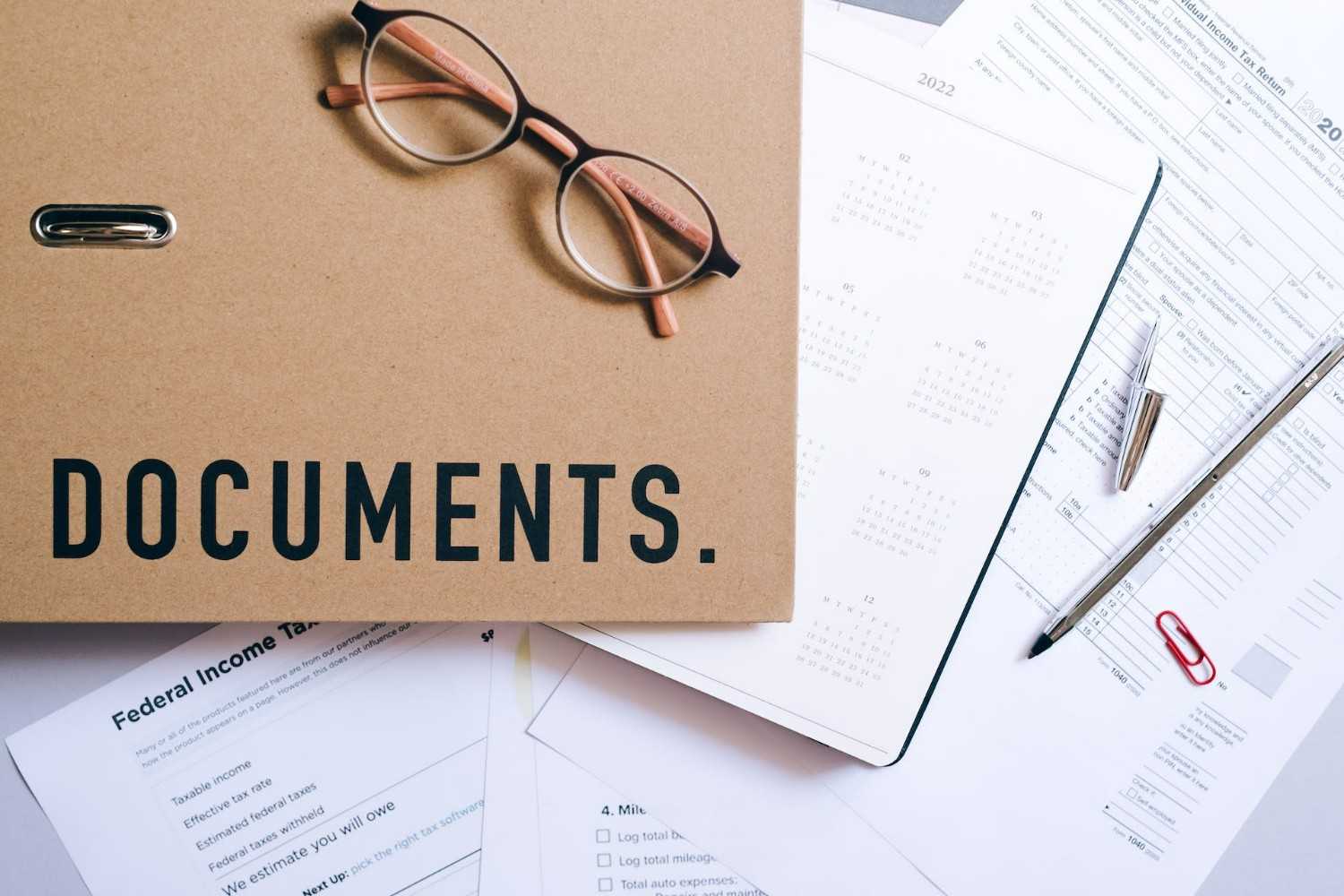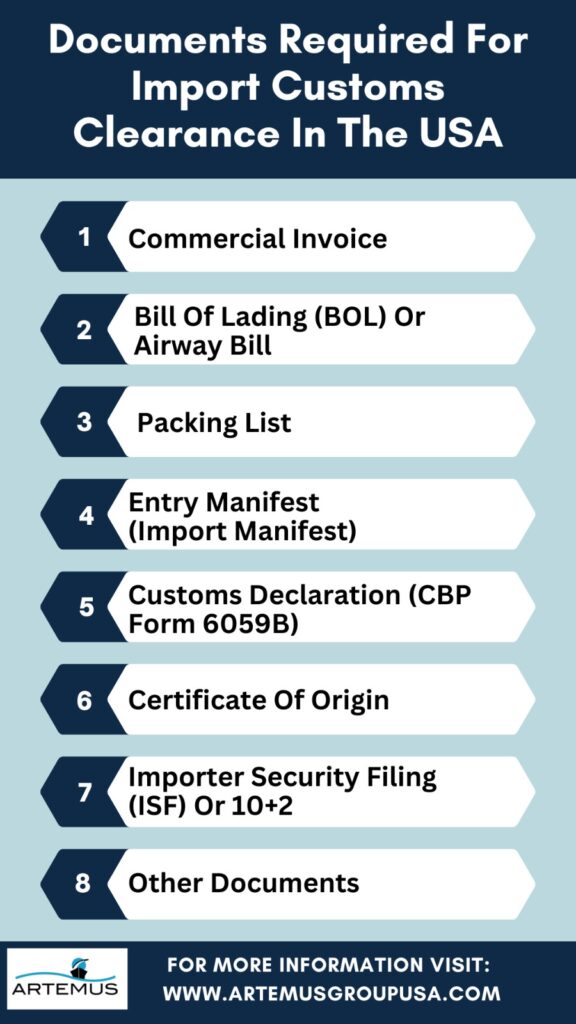
What Is Inbound Logistics & Outbound Logistics? A 2025 Guide
In the dynamic world of supply chain management, understanding the nuances of inbound and outbound logistics is crucial for operational

In the realm of international trade, navigating customs clearance procedures can be a complex and daunting task. Understanding the required documentation for customs clearance in key trading nations like the USA, India, and Japan is essential for smooth and efficient transactions.
In the USA, essential documents include the commercial invoice, bill of lading, and customs declaration form, while India mandates documents such as the bill of entry and commercial invoice. Japan requires documents like the customs declaration form and certificate of origin.
However, with the support of Artemus Transportation Solution‘s cutting-edge software, including ISF, AMS, and Japan AFR, businesses can streamline their customs clearance processes with ease, ensuring compliance and efficiency across borders. Let’s delve deeper into the specific documents required for customs clearance in each of these countries and how Artemus’s innovative solutions can revolutionize the import-export landscape.
Table Of Contents
Custom clearance documents play a crucial role in the international trade process, facilitating the smooth movement of goods across borders while ensuring compliance with customs regulations. Here, we’ll delve into some of the common types of custom clearance documents:
The commercial invoice is perhaps the most fundamental document in the customs clearance process. It serves as a bill for the goods sold between the exporter and the importer. This document includes essential details such as the description of the goods, their value, quantity, weight, and any applicable taxes or duties.
A packing list provides a detailed breakdown of the contents of each package being shipped. It includes information such as the number of packages, their dimensions, weight, and a description of the contents. This document helps customs officials verify the contents of the shipment and ensure they match the information provided in the commercial invoice.
The bill of lading (for ocean shipments) or airway bill (for air shipments) serves as a contract between the shipper and the carrier. It provides details about the transportation of goods, including the names and addresses of the shipper and consignee, the vessel or flight number, port of loading and discharge, and a description of the goods being transported. The bill of lading or airway bill is essential for customs clearance and serves as proof of ownership of the goods during transit.
The certificate of origin is a document that verifies the nation where the goods were produced or manufactured. It is often required by customs authorities to determine eligibility for preferential treatment under various trade agreements or to assess the appropriate tariffs and duties. The certificate of origin helps prevent the fraudulent claiming of preferential treatment and ensures compliance with rules of origin requirements.
Import and export licenses are permits issued by government authorities that authorize the importation or exportation of specific goods. These licenses may be required for goods that are subject to regulatory controls, such as restricted or prohibited items, or for compliance with trade agreements or sanctions. Customs authorities may request import/export licenses as part of the customs clearance process to verify the legality of the shipment.
A customs declaration form is a document completed by the importer or exporter to provide information about the goods being imported or exported. It typically includes details such as the value of the goods, their country of origin, and any applicable tariffs or duties. Customs declaration forms help customs authorities assess the proper classification and valuation of goods and ensure compliance with import/export regulations.
Related: How Long Does Customs Clearance Take? Key Takeaways

Custom clearance in the United States involves a series of stringent procedures and requirements to ensure the smooth flow of goods across its borders. Understanding the necessary documents for customs clearance is crucial for importers and exporters to navigate this process effectively. Here are the customs clearance documents required in the USA:
The commercial invoice is a detailed document that provides information about the goods being imported, including their description, quantity, value, and terms of sale. It serves as a legal record of the transaction between the buyer and seller and is required by US customs to assess duties and taxes.
For shipments transported by sea, the Bill of Lading (BOL) is essential. It serves as a contract between the shipper and the carrier, detailing the terms of transportation and ownership of the goods. For air shipments, the Airway Bill serves a similar purpose, documenting the transportation of goods by air.
A packing list provides a detailed inventory of the contents of each package in the shipment. It includes information such as the quantity, weight, dimensions, and description of the goods. Customs officials use the packing list to verify the contents of the shipment against the information provided in the commercial invoice.
The entry manifest is a document that lists all goods arriving in the United States by vessel or aircraft. It includes details such as the names and addresses of the shipper and consignee, the description of the goods, and their quantities. The entry manifest is submitted to US Customs and Border Protection (CBP) before the arrival of the goods to facilitate clearance procedures.
The customs declaration form, also known as CBP Form 6059B, is completed by travelers entering the United States and by importers for commercial shipments. It requires information about the traveler or importer, details of the goods being imported, and declarations regarding customs duties, taxes, and prohibited items.
The certificate of origin is a document confirming the country where the goods were produced or manufactured. It may be required by US customs to determine eligibility for preferential trade treatment under free trade agreements or to assess the proper classification and valuation of goods.
The Importer Security Filing (ISF), commonly referred to as the “10+2” rule, mandates that importers furnish detailed information regarding their shipments to CBP prior to the loading of goods onto a vessel destined for the United States. This includes details about the importer, seller, container stuffing location, and contents of the shipment.
Depending on the nature of the goods and specific import requirements, additional documents may be required, such as import licenses, permits, certificates of compliance, or other regulatory documents.
Related: Shipment Has Been Given A Release Status By Customs
Customs clearance in Japan involves specific procedures and documentation requirements to ensure the smooth importation and exportation of goods. Understanding the necessary documents for customs clearance is essential for businesses engaging in international trade with Japan. Here are the customs clearance documents required in Japan:
Similar to many other countries, Japan requires a customs declaration for imported goods. This document provides details about the importer, and exporter, description of the goods, quantity, value, and other pertinent information necessary for customs clearance. The customs declaration is typically completed by the importer or their authorized representative.
A commercial invoice detailing the goods being imported is required for customs clearance in Japan. This document includes information such as the description of the goods, their value, quantity, weight, and terms of sale. It serves as proof of the transaction between the buyer and seller and is used by customs officials to assess duties and taxes.
A packing list provides a detailed inventory of the contents of each package in the shipment. It includes information such as the quantity, weight, dimensions, and description of the goods. Customs officials use the packing list to verify the contents of the shipment and ensure compliance with the information provided in the commercial invoice.
For shipments transported by sea, the Bill of Lading (BOL) is required, while for air shipments, the Airway Bill serves the same purpose. These documents detail the terms of transportation, ownership of the goods, and other relevant information about the shipment. They are essential for customs clearance and serve as proof of shipment and receipt.
Certain goods may require import or export licenses or permits for clearance in Japan. These licenses are issued by relevant government authorities and indicate that the goods meet specific regulatory requirements. Importers must ensure they have the necessary licenses or permits before attempting to clear their goods through customs.
The certificate of origin certifies the country in which the goods were produced or manufactured. It may be required by Japanese customs authorities to determine eligibility for preferential tariff treatment under trade agreements or to assess the proper classification and valuation of goods.
Depending on the nature of the goods and specific import/export requirements, additional documents may be required, such as certificates of compliance, inspection certificates, phytosanitary certificates (for agricultural products), or other regulatory documents.
Importers are responsible for paying any applicable customs duties, taxes, or fees upon importation of goods into Japan. Proper documentation of duty payment or arrangements for duty deferment should be in place to facilitate customs clearance.
Related: Customs Compliance Software: Key Benefits & Top Suggestions
Customs clearance in India involves a series of procedures and documentation to facilitate the movement of goods across international borders while ensuring compliance with relevant laws and regulations. Whether importing or exporting goods, proper documentation is essential to expedite the clearance process and avoid delays or penalties. Here’s an overview of the key customs clearance documents required in India:
The Bill of Entry is a comprehensive customs declaration form providing details such as goods’ description, quantity, value, and origin. It serves as the primary document for assessing duties and taxes upon importing goods into India, with different forms for various types of imports.
This document outlines the specifics of the transaction, including the goods’ value, quantity, and terms of sale. It serves as a vital record for customs valuation purposes and ensures accurate assessment of duties and taxes.
A detailed inventory of each package or container, the packing list includes information on weight, dimensions, and packaging type. It aids customs officials in verifying the contents of shipments and ensures compliance with import/export regulations.
Also known as a Shipping Declaration, this form provides essential information about the consignment, such as importer/exporter details, goods description, and declared value. It serves as a declaration of compliance with customs regulations and facilitates customs clearance processes.
Certain goods require specific licenses or permits from relevant authorities. These documents authorize the import/export of restricted items and must be presented to customs officials during clearance to ensure compliance with regulatory requirements.
This document certifies the country of origin of the goods and may be necessary to determine eligibility for preferential duty rates or to comply with import quotas. It helps verify the authenticity of the goods and their compliance with trade agreements.
If the goods are insured during transit, an insurance certificate provides proof of coverage. It is required to facilitate customs clearance and ensure adequate protection against risks associated with international trade.
These include the Bill of Lading (for sea freight), Airway Bill (for air freight), or Railway Receipt (for rail freight), which serve as evidence of the contract of carriage and ownership of the goods. They are essential for tracking shipments and verifying their movement across borders.
Used for payment transactions, a Letter of Credit outlines the terms and conditions of payment between the importer and exporter. It may be required by customs officials to ensure compliance with payment obligations and facilitate smooth clearance processes.
Depending on the nature of the goods, certificates of conformity, inspection, or quality may be required. These documents certify that the goods meet specific standards and regulations, ensuring their safety, quality, and compliance with import requirements.
Related: How To Do Custom Clearance In USA For Goods? The Process
Accurate documentation is paramount in customs clearance for several critical reasons:
Related: Custom Clearance Charges & Fees: A Complete Guide
Artemus offers comprehensive customs clearance support with its advanced ISF (Importer Security Filing), AMS (Automated Manifest System), and Japan AFR (Advanced Filing Rules) software solutions. With Artemus, businesses can streamline their import and export processes, ensuring compliance with regulatory requirements and facilitating smooth customs clearance.
The ISF software enables timely submission of essential shipment information to US Customs and Border Protection, helping to avoid penalties and delays. Meanwhile, the AMS software provides automated manifest filing for ocean shipments, enhancing efficiency and accuracy in documentation. Additionally, the Japan AFR software simplifies compliance with Japan’s advanced filing rules, ensuring seamless entry into the Japanese market.
The document required for customs clearance varies depending on the country and specific regulations, but generally, the commercial invoice is a fundamental requirement providing essential information about the imported or exported goods.
The customs clearance process involves the inspection and documentation verification of goods entering or leaving a country’s borders to ensure compliance with import/export regulations and to assess applicable duties and taxes.
Custom documents are legal paperwork required for the import or export of goods, including invoices, packing lists, bills of lading, and certificates of origin, used to facilitate customs clearance and ensure compliance with regulations.
The mandatory documents for import typically include a commercial invoice, bill of lading or airway bill, packing list, import license or permit (if applicable), and any other specific documentation required by the importing country’s customs authorities.

Navigating the customs clearance process in key trading nations like the USA, India, and Japan requires careful attention to detail and adherence to specific documentation requirements. From commercial invoices to certificates of origin, each country has its own set of mandatory documents crucial for smooth import and export operations. Understanding and fulfilling these requirements is essential for avoiding delays, penalties, and other complications at customs. Whether you’re conducting business in the USA, India, Japan, or beyond, ensuring compliance with customs clearance documentation is vital for successful international trade.

In the dynamic world of supply chain management, understanding the nuances of inbound and outbound logistics is crucial for operational

In today’s interconnected world, businesses rely heavily on global trade to expand their markets, access new resources, and drive growth.

Importing goods for resale in the USA presents a lucrative business opportunity, but navigating the complexities of U.S. customs regulations,
Get In Touch
Artemus’ Software Solutions for ISF, AMS, Japan AFR, eManifest Canada, & Panama B2B filings.